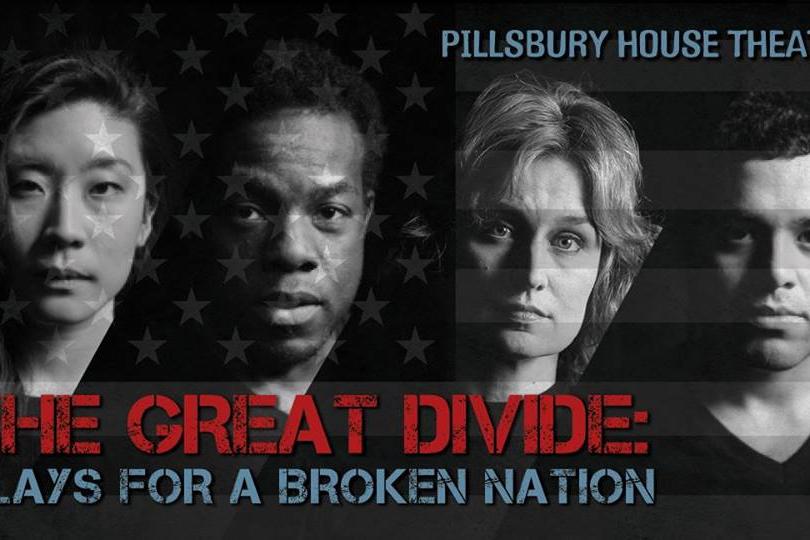An important first step

When picking the best of something, sometimes it’s a no brainer—one thing stands alone in a field and I can name it easily. However, in thinking back to productions that I saw in 2017, I honestly was stumped because the range made it feel like comparing apples to oranges—and somedays I really want an apple and somedays I’m most definitely feeling that orange. So, when pressed to make a decision, pardon me for taking a bit of a shortcut, but there was one production I was involved in as an artist that felt particularly significant—and not just because I was a contributing artist.
Let me preface this by saying that having spent the past year in the company of artistic leaders of producing entities from all around the country, it was an appalling discovery that not everyone felt compelled to rethink their season programming following the election results. Isn’t a critical role of art to reflect (and respond to) what is happening in society? So how can those in positions of power at arts organizations act like it’s just business as usual in a year where we saw multiple threats to arts funding and plenty of other behavior that is not normal?
One institution that did respond swiftly and directly was Pillsbury House Theatre. They announced that the first show of their season would be a piece titled The Great Divide: Plays For A Broken Nation. As part of the production, five local playwrights were commissioned to write short plays in response to this title and the plays would constitute an evening of theater to be performed by an ensemble of four actors. Furthermore, an inclusive approach was taken to selecting the actors and array of writer’s voices showcased. The evening of ten(ish) minute plays were tied thematically, despite being varied tonally and stylistically, which worked in the show’s favor by offering humor and drama, realism and absurdism—all directed by the versatile and astute Ellen Fenster. The final thread through the evening was DJ Chamun, who spun an eclectic and engaging array of music between each of the five plays.
At rise, the stage was painted like a map of the United States...but with some states painted blue and others red...perhaps, it’s not so united after all. As the lights dim to dark, a montage of voices in different languages share varying reactions, hopes, and fears following the election as a gorgeous display of neon lights create an abstract U.S. flag that is somewhat deconstructed. It was a perfect atmospheric opening that inspired both wonder and the chills. The first play of the evening was a two-hander written by James A. Williams that featured Ricardo Vazquez and Mikell Sapp. This play was a slice of realism about two men who meet at the gym and strike a quick connection. The piece was beautifully infused with humor particularly in occasional, calculated moments that allowed us to peer into their thoughts through direct address monologues to the audience. The complication revolved around a conversation of privilege—or rather the request to have a conversation around privilege—that gets summed up in a beautiful gut punch final line, “Unpacking Privilege 101: Change will come, it just doesn’t always happen on your time.” Both actors were mesmerizing in these roles and made it easy to invest in this relationship between strangers, who will probably never be more than acquaintances.
The following four pieces utilized the full ensemble of actors, which also included Audrey Park and Tracey Maloney. The second play by Katie Ka Vang put Park at the center of a dark comedy about health care. Upon being diagnosed with cancer, a woman is immediately slammed with doctors, nurses, other patients—all flinging information, options and opinions at her—as god-like voice keeps a running tally of costs incurred. It’s a dizzying experience that also inspires laughs through the final punchline of “Cost of being left alone: priceless.” It’s followed up by the other comedy of the evening by Alan Berks that takes the classic two, liberal couples at a dinner party scenario to absurdist levels and, ultimately, becomes a tale of how progressives can quickly faction and eat their own. The fourth piece of the evening was an elegantly structured drama by Christina Ham that examined four neighbors in a neighborhood in transition. The piece begins in a time that feels Obama-era then moves into a dystopic vision of the future. In his role as a reclusive veteran, Sapp truly shined here. Lighting and audio were also utilized to particularly stunning effect. The final piece by yours truly was a meditative poem staged as a movement piece complete with actors blowing bubbles into the audience, while searching for the meaning and practicality of the concept of “utopia.”
As an artist, I believe in asking questions, facilitating interactions, and stimulating curiosity as the whole point of our work. And my association to the production aside, I must say as an audience member, I rarely engage with work that felt this immediate and meaningful. Every night was sold out. Every night had a talkback where most of the audience remained to engage with the artists and each other. One night that I attended, an identified Trump voter came up to me afterward, shook my hand, and introduced himself. Even if we couldn’t have been more different politically, the fact that a theater production brought us into the same room and into civil (and literal) contact seemed like an important first step toward a conversation that might lead to some sense of understanding.


